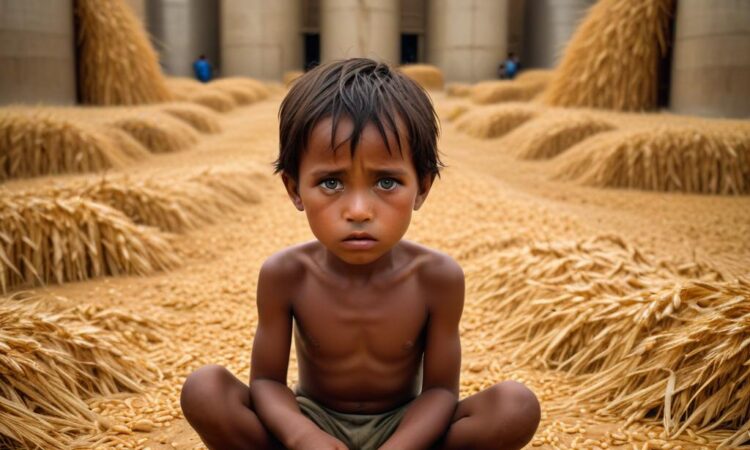Global Food Crisis Worsens: Rising food prices and shortages, exacerbated by conflict, climate change, and supply chain disruptions, lead to widespread hunger and social unrest. Controversy focuses on the role of international trade policies, corporate practices, and climate change mitigation efforts.
The world is facing a deepening global food crisis, a complex and multifaceted challenge driven by a confluence of factors that are pushing millions towards starvation and exacerbating existing inequalities. Rising food prices, coupled with widespread shortages, are creating a humanitarian emergency of unprecedented scale, triggering social unrest and instability in numerous regions.
One of the most significant contributors to this crisis is the ongoing conflict in Ukraine. Ukraine and Russia are major exporters of wheat, corn, and sunflower oil, and the war has severely disrupted their agricultural production and export capabilities. The resulting reduction in global grain supplies has sent shockwaves through international markets, leading to sharp increases in the price of staple foods across the globe.
Climate change is also playing a significant role in exacerbating the food crisis. Extreme weather events, such as droughts, floods, and heatwaves, are becoming increasingly frequent and intense, damaging crops and reducing yields. These events disproportionately impact vulnerable populations in developing countries, who often lack the resources to adapt to changing climatic conditions.
Supply chain disruptions, further aggravated by the pandemic and the war in Ukraine, are adding another layer of complexity to the crisis. Disruptions to transportation, logistics, and manufacturing have led to shortages of essential inputs for food production, increasing costs and further limiting the availability of food.
The escalating food crisis has sparked intense debate over the role of international trade policies. Critics argue that protectionist measures, such as export restrictions and tariffs, exacerbate the problem by limiting the flow of food to countries in need. They advocate for greater cooperation and coordination among nations to ensure equitable access to food resources.
Corporate practices are also under scrutiny. Concerns are raised about the concentration of power in the hands of a few large multinational corporations that control significant portions of the global food supply chain. Accusations of price gouging and unfair trade practices have intensified, adding fuel to the debate over the ethical responsibilities of corporations in addressing the crisis.
Climate change mitigation efforts are a crucial aspect of addressing the long-term sustainability of the global food system. Investing in climate-resilient agriculture, promoting sustainable farming practices, and reducing greenhouse gas emissions are essential to ensuring food security in a changing climate. However, the financial and political challenges associated with such initiatives remain substantial.
The humanitarian consequences of the global food crisis are severe. Millions of people are facing acute hunger and malnutrition, with particularly devastating impacts on children and vulnerable populations. Widespread food insecurity is leading to increased malnutrition, disease, and mortality rates. Moreover, the crisis is contributing to social unrest and conflict, as people struggle to access basic necessities.
Addressing the global food crisis requires a multifaceted and coordinated approach. International cooperation, policy reforms, and investments in sustainable agriculture are crucial to ensuring food security for all. This includes strengthening global food supply chains, supporting smallholder farmers, and investing in research and development to improve crop yields and resilience to climate change. Furthermore, addressing the underlying drivers of the crisis, such as conflict and inequality, is essential to achieving long-term solutions.
The crisis highlights the urgent need for a paradigm shift in how we produce, distribute, and consume food. Sustainable and equitable food systems that prioritize the needs of vulnerable populations and protect the environment are essential for achieving food security for all and preventing future crises. This necessitates a fundamental rethinking of our relationship with food, incorporating social, economic, and environmental considerations.
The interconnectedness of the factors contributing to the global food crisis underscores the need for a holistic approach involving governments, international organizations, corporations, and civil society. Joint efforts are crucial to develop and implement effective strategies to mitigate the immediate effects of the crisis and to build more resilient and sustainable food systems for the future. Without concerted action, the current crisis risks escalating into a protracted humanitarian catastrophe with devastating global consequences.
The severity of the global food crisis necessitates immediate and sustained action. Delayed or inadequate responses will only exacerbate the suffering of millions and further destabilize already fragile regions. A comprehensive strategy, incorporating immediate relief efforts, long-term investments in sustainable food systems, and collaborative governance structures, is crucial to navigate this complex challenge and safeguard the future of food security worldwide. The global community must act decisively to prevent a further deterioration of the situation and to build a more just and equitable food system for all.
The scale of the problem demands innovative solutions, leveraging technological advancements, fostering international collaboration, and empowering local communities. Investing in research and development to improve crop yields, enhancing infrastructure to improve food distribution, and promoting sustainable agricultural practices are key elements of a comprehensive strategy. Furthermore, addressing issues of access to land, credit, and markets for smallholder farmers is critical to enhancing their resilience and productivity.
Ultimately, overcoming the global food crisis requires a fundamental shift in global priorities, prioritizing food security alongside other critical development goals. This necessitates increased financial resources, targeted interventions, and a commitment to building more resilient and sustainable food systems that are capable of meeting the needs of a growing global population in the face of unprecedented challenges. The crisis presents a stark reminder of our interconnectedness and the urgent need for collective action to address this global challenge.
The ongoing global food crisis serves as a stark warning of the interconnectedness of global challenges and the urgency of addressing them collaboratively. It underscores the need for a fundamental shift towards sustainable and equitable food systems, incorporating social, economic, and environmental considerations. Failure to address the root causes of the crisis risks exacerbating existing inequalities, fueling social unrest, and jeopardizing the long-term prospects for global food security.

